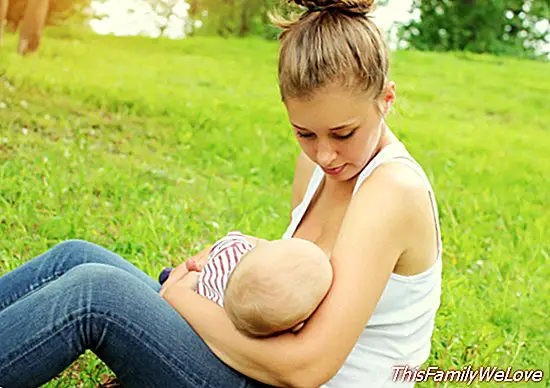Breastfeeding in summer, tips to avoid possible problems
Not everything is perfect in summer. The arrival of this period supposes an increase of the temperatures that is quite difficult to face by the people habitually. This situation becomes even more complicated in the case of mothers who breastfeed to your child since the heat causes physical changes in your body that can alter breastfeeding and that, therefore, should be taken into account.
Knowing the influence of heat will allow the mother to prevent these aspects and can remedy them. The first thing to know is that there are two points that must be taken into account, on the one hand how the high temperatures affect the mother, who is the one breastfeed. On the other, what effects does the increase in mercury have on the infant?
The heat and the mother
The lactation specialists of Top Doctors They explain that heat influences the mother who breastfeeds in two ways. On the one hand, the rise in temperatures and the continuous direct contact with the baby during the takings causes that the perspiration increases and there is a reduction of the natural hydration that leads to the decrease of milk. The solution is clear: the woman must increase the intake of water or liquids throughout the day.
When breastfeeding you should also look for fresh places sheltered from heat and sun to make the shots and have a bottle of water handy to avoid interrupting thirst. It is also advisable to place a thin gauze between the skin of the mother and the baby to reduce the increase in body temperature of both by the direct contact and in this way to avoid irritating the skins of both.
The second aspect that should be taken into account in this area is that the heat can cause an increase in irritability, apathy and fatigue in the nursing mother. The levels of oxytocin They increase when the baby sucks, causing more thirst. But experts explain that there is no problem in the mother drinking water or any other liquid while breastfeeding her child.
High temperatures and lactating
To know the influence of heat on nursing infants, the first thing that must be taken into account is that the metabolism of the small is faster than that of adults and therefore there is a greater risk of dehydration. At this point, experts advise breastfeeding on demand, and shorten the time between shots to prevent water levels from falling in children.
There are several symptoms that indicate that the baby is thirsty, such as nodding or often remove the tongue and put the hand to the mouth. You can also see the lack of water in the reduction of urine or in the concentrated voices, of more dark aspect and stronger smell. Other indicators of alarm could be the greater drowsiness, irritability, cold sweat, the loss of habitual vitality or the increase of the heart and respiratory rate.
Since 88% of breast milk is made up of water, the baby does not need water between feedings and in the case of having less than 6 months and take the breast on demand. After 6 months, if you have already introduced another type of food, it is good to offer this liquid in a glass and not directly from the bottle or bottle. As it grows larger and takes more solid food, it will be necessary to ensure greater hydration.
Tips for breastfeeding in summer

Experts advise families who are going to weigh a summer with a nursing baby the following tips:
- Do not plan a tight tourist calendar in the first months of lactation, especially during the first month.
- If you are going to take a long car trip, it is necessary to make sure to stop and breastfeed the baby during the journey. We look for a comfortable and cool position for both, without hurry.
- In case of a trip by train or plane, the baby will travel in the arms of the mother using a special belt. The woman can breastfeed at any time. Place a thin gauze between the skin of the mother and the baby during breastfeeding, to reduce the body temperature of both.
- Always have a bottle of water to avoid interrupting breastfeeding because of the thirst that appears during the process.
- If fan or air conditioning is used, or you are in a room where you have ventilation, you should try to avoid exposure of the baby to the air flow.
- Monitor the use of diapers. Stop checking that the baby is well hydrated, must wet between 6 and 7 diapers during the day.
Damián Montero




